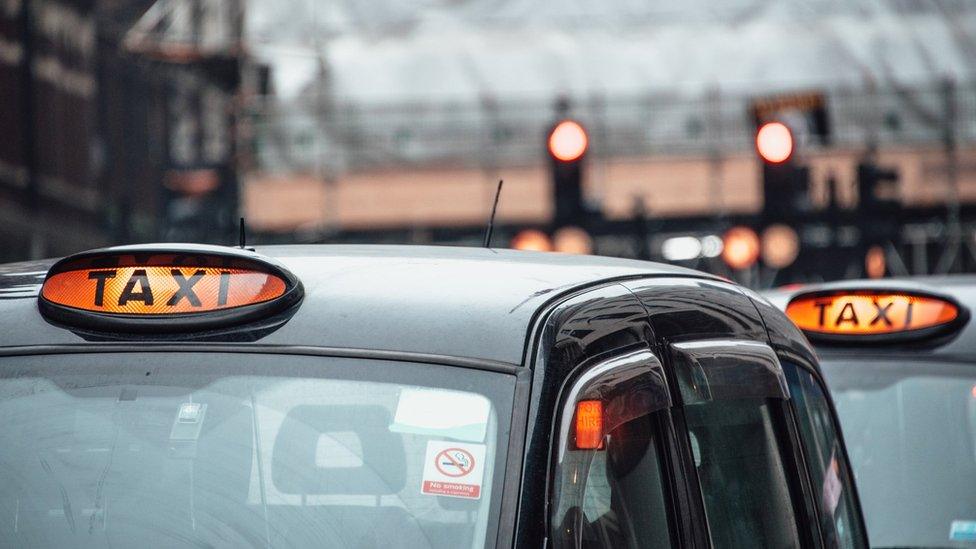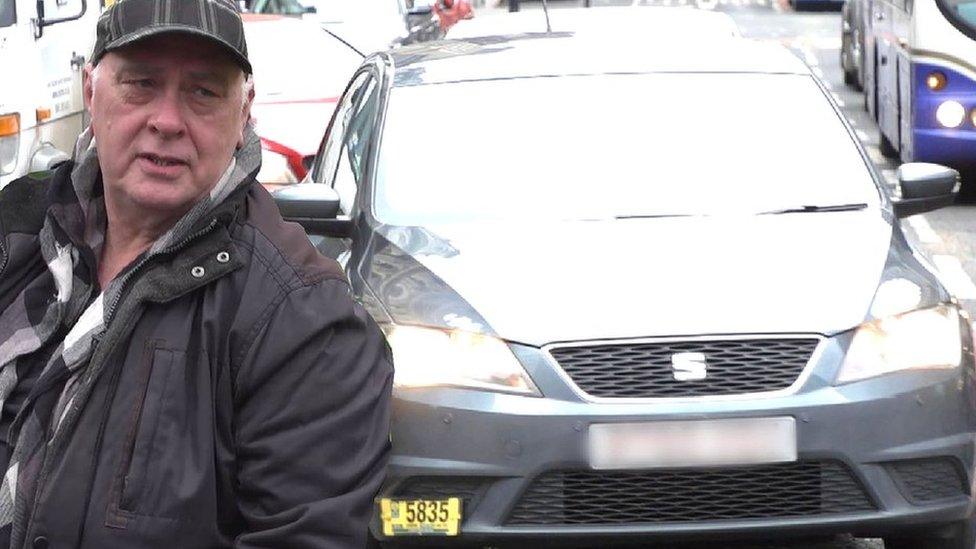Covid in Scotland: Taxi grant 'not for those on state benefits'
- Published
- comments

Taxi journeys have fallen significantly since the start of the pandemic
A new grant of £1,500 being offered to taxi and private hire drivers is not available to those claiming state benefits, it has emerged.
Drivers affected by a huge drop in passenger numbers as a result of the pandemic are being encouraged to claim a £1,500 grant.
It will be available for costs, including licence fees and insurance payments for taxis not on the road.
But the Scottish government confirmed that not all drivers would benefit.
Those drivers who are already claiming state benefits - including Universal Credit, Statutory Sick Pay, Employment and Support Allowance, Job Seekers' Allowance or Income Support - between 17 March and 31 December 2020, or have applied for but not yet started receiving Universal Credit at the time of applying are not eligible for the fund.
The Scottish government said there was risk that if the grant was paid to people on Universal Credit, it would count as income and result in a reduction in their benefits.
It is calling on the Department for Work and Pensions to amend its criteria to ensure that drivers on Universal Credit can benefit from the full £1,500 payment.
However, the DWP said the Scottish government was being "misleading" and "has significant welfare powers" of its own.
Taxi journeys have fallen significantly since the start of the pandemic, with the Unite Union claiming 80% of taxi drivers have lost up to three quarters of their usual incomes.
While taxis are still allowed to operate despite the latest lockdown, they have seen passenger numbers fall away as bars, restaurants and schools closed.
It comes as the government introduced new tighter Covid restrictions at the weekend limiting takeaway outlets and click-and-collect shopping.
'Unprecedented circumstances'
Announcing the grant, Finance Secretary Kate Forbes said: "We know how difficult this pandemic has been for taxi drivers and their families. They've truly gone the extra mile, continuing to provide a vital service for key workers and vulnerable individuals throughout the lockdown and beyond.
"Following the introduction of tighter regulations at Christmas I have trebled the budget originally announced for this fund to £57m, enough to provide grants of £1,500 to all of Scotland's 38,000 taxi and private hire drivers."
To be eligible for the scheme, taxi and private hire drivers must be licensed for the period 9 October 2020 to at least 31 January 2021.
Scotland's largest licensed taxi operator, Glasgow Taxis, said it welcomed any financial help for drivers - but questioned the decision to exclude those on Universal Credit.
"We are upset that some drivers, who may have been so affected by the unprecedented circumstances in 2020 that they had no option but to claim Universal Credit, are unable to access this fund," it said in a statement.
"An additional issue is the fact that some drivers who have temporarily changed to other jobs, such as in supermarkets or the NHS, will benefit from the fund while operators cannot benefit from the fund and may not be able to continue with taxi loans, insurance, fixed costs and no drivers."
'Drivers on their knees'
The Scottish Conservatives economy spokesman Maurice Golden said: "Like so many other SNP business support measures, this money is long overdue. But it comes with strings attached, making it inaccessible to many who are in desperate need.
"The SNP government urged taxi drivers to claim Universal Credit yet are now penalising them by using these claims as an excuse to block payment of the new lifeline grants.
"These drivers are on their knees through no fault of their own and they will be rightly furious at this decision."
Scottish Labour's economy spokesperson Alex Rowley said: "We simply cannot have thousands of taxi drivers, in particular those most at risk, being unable to receive this support.
"The support package is welcome, but without taking action to alter it the SNP risks discriminating against thousands of the poorest drivers."
A Scottish government spokeswoman said: "Universal Credit payments reduce as a person's income increases so we are concerned that any payment would simply be deducted from an applicant's benefits. Without a change, making these payments would benefit the DWP, not the drivers.
"We are calling on the DWP to amend their criteria to ensure that drivers on UC can benefit from the full £1,500 payment - if they make that change we will amend our criteria."
The DWP said the Scottish government "can top-up existing benefits, pay discretionary payments and create entirely new benefits in areas of devolved responsibility".
It added: "The UK government has provided an additional £8.6bn in funding to the Scottish government to tackle the pandemic in Scotland."


Related topics
- Published20 October 2020

- Published9 October 2020
